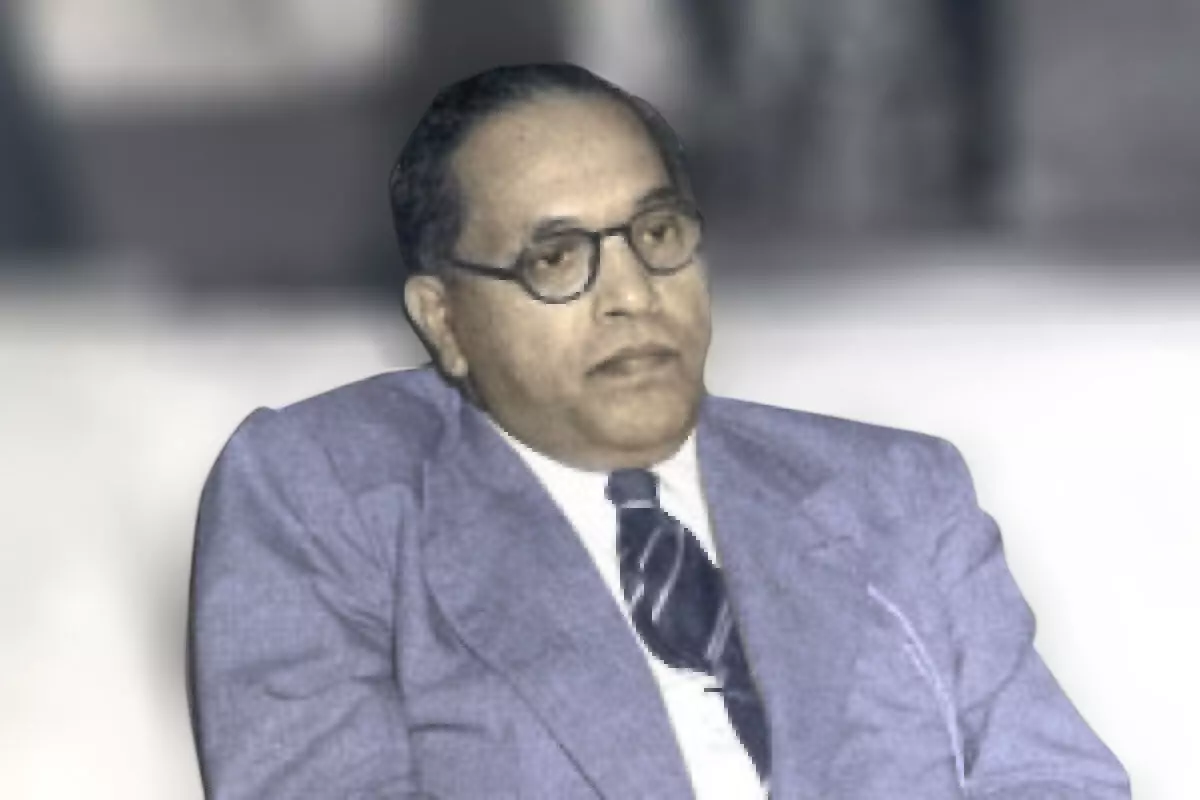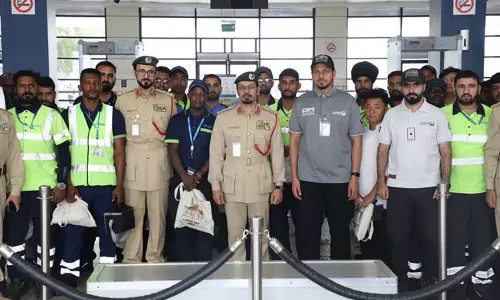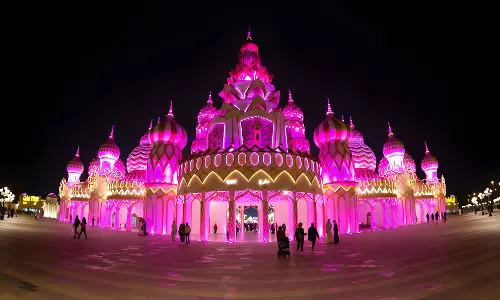

How the nation treated the memories of Ambedkar
text_fieldsThe power equations has changed in many ways in Delhi,the capital city of India. Going back in time of Indian politics, memories reach 26-Alipore Road beyond the Delhi Civil Line Metro Station. Adjacent left to the Oberoi Maidens Hotel, the epitome of luxury, stood the black-painted gates of a not-so-dilapidated courtyard adjoining the capital City.
The house, with its lush green lawn and flowerless garden, seemed to be on the verge of extinction for a long time without coming out to the limelight It was there that Dr. Bhimrao Ramji Ambedkar, the man who relentlessly fought against the oppressive caste system in the Indian society throughout his life and the framer of Indian constitution spent his last days.
It has been years since the old one was wiped out and a new monument erected. Perhaps the most important Ambedkar monument outside the Parliament is in the country's capital. But history and contemporary politics literally marked a great injustice to that eminent personality. At the monument, inaugurated by Prime Minister Narendra Modi with great fanfare on Ambedkar is depicted as an anthropologist!
Ambedkar's biography as the sculptor of the Constitution and as a man who fought against caste discrimination in India for the rest of his life is ignored and labeled as an 'anthropologist' and 'scholar'.
Ambedkar's biography as the sculptor of the Constitution and as a man who fought against caste discrimination in India for the rest of his life is ignored and labeled as an 'anthropologist' and 'scholar' in the memorial
How he reached at that home
Baba Saheb Ambedkar was the first law minister of independent India. He had a painful history behind coming to this house on Alipur Road, Delhi. Ambedkar, who rose from the sighs of the oppressed masses to the center of power with the hands of knowledge, was not spared the neglect and persecution in the name of caste or clan.
Ambedkar lived in the official residence as a minister at No. 1 Tilak Marg. But his residence in that official residence did not last long. Ambedkar resigned from the law ministry after clashing with the Nehru cabinet over the Hindu Code Bill. Following his resignation from the Union Cabinet, he voluntarily left his official residence.
Although it was a post-independence period, there was an India that did not begin to fade from the shadows of monarchy. The not-so-wealthy king of Sirohi in Rajasthan had a resting place in Delhi. Three acres, though nothing like a palace, a house that is generally better in area. Out of respect towards Ambedkar, King Sirohi left his residence in the capital for Ambedkar to live in, which is at 26, Alipur Road. That is how Ambedkar got a residence in the capital city.
Ambedkar moved here with his wife Savita. It was here that he converted to Buddhism. He also authored a book, 'The Buddha and His Dharma'. Ambedkar lived in this house until his last breath contributing his exemplary life to history in December 1956.
Ambedkar lived in this house until his last breath contributing his exemplary life to history in December 1956
History of the oblivion
After independence, the Sirohi dynasty faced financial crisis as the days of glory the for the monarchy fell. The royal family sold the house they had left to Ambedkar to stay in Delhi to the Jindal Group. As soon as they took possession of it, they demolished the old house where Ambedkar lived and built a luxurious house for them to live in. Although the personality of Ambedkar is cherished by history and the people, successive governments have tried to keep this incident in oblivion.
It was Joseph Maliakkal a senior Delhi-based journalist originally from Kerala, who was one among the many who worked behind the attempts to bring back the last resting place of Ambedkar as a memorial for him. Although Maliakkal officially retired from journalism, he continues to be active in a life of democratic consciousness.
It was Joseph Maliakkal a senior Delhi-based journalist originally from Kerala, who is one among the many who worked behind the attempts to bring back the last resting place of Dr Ambedkar
The country itself, directly and indirectly, kept Ambedkar on the sidelines. A monument to the architect of the Constitution, who died in 1956, was erected in the capital city, 62 years later in 2018. Joseph Maliakkal with some others fought for a long time, demanding that the house he lived in be preserved and turned into a monument.
To campaign for the acquisition of 26 Alipur Road ,the last residence of Ambedkar, Mr R.L.Kain an officer in Delhi Administration founded the 'Ambedkar Vichar Manch' and Joseph Maliakan at that time a reporter with the Indian Express, Delhi joined the campaign and wrote a number of reports in the Indian Express.
Initially the attitude of the Central Government was very negative and even asked the Manch to provide proof that Ambedkar lived at 26 ,Alipur Road in his last days.
The procedure to acquire the house from Jindal Group was extended for various reasons. Finally, On March 7, 1996, the then Welfare Minister Sitaram Kesari told the Lok Sabha that Rs 10 crore had been spent to take over the house. However, the Delhi government postponed the land acquisition citing legal issues and the fund lapsed. The struggles for it continued. In 2003, the central government took over the house from the Jindal Group and began the process of turning it into a museum.
A multi-storey building in the name of Ambedkar inaguarated by Prime Minister Narendra Modi in 2018
A museum for the sake of it
It was decades later, after many struggles of some people to keep history alive, the government took over the house where Ambedkar's memory sleeps. However,no attempt was there to evoke those memories in any way and it was completely ignored. Pictures without captions, rooms without a custodian ... The Ambedkar Memorial in the capital is still in a state of disrepair.
Joseph Maliakkal points out that the house is still in emptiness today, as if it were a museum just for the sake of it. Then 15 years later, the memorial was changed to what it is currently.
Joseph Maliakkal also pointed out that the person appointed as the head of this memorial was not someone who had devoted his life to studies or research on Ambedkar. Joseph Maliakkal has a lot to say from his journalistic career, which has always focused on the news and stories of the marginalized. He says that just as Ambedkar was neglected in India, so is Ayyankali, a social reformer in the history of Kerala.
" I have not seen Ayyankai being mentioned in any of my Malayalam textbooks.The same thing is happening with Ambedkar, "he added.
Joseph Maliakkal points out that the house is still in emptiness today, as if it were a museum just for the sake of it. Then 15 years later, the memorial was changed to what it is currently
The house which Ambedkar lived in when he was a minister
The house where Ambedkar lived when he was the law minister is still in the capital with signs of pride. Ambedkar lived here from 1948 to 1951 while he was the part of Nehru Cabinet.
The new resident is Adam Burakowski, the Polish Ambassador to India. This place, now known as Tilak Road, was Harding Avenue during Ambedkar 's stay. Nothing much has changed here. All the tables and chairs here were used by Ambedkar. The house had belonged to the Kanika dynasty of Odisha. Poland bought the house from them in 1978.
Ambedkar had lived at Prithviraj Road when he was a member of the Executive Council of the British Viceroy. Zakir Oskan Torunlar, the Turkish Ambassador to India, now resides at Prithviraj Road, where Ambedkar lived once.























